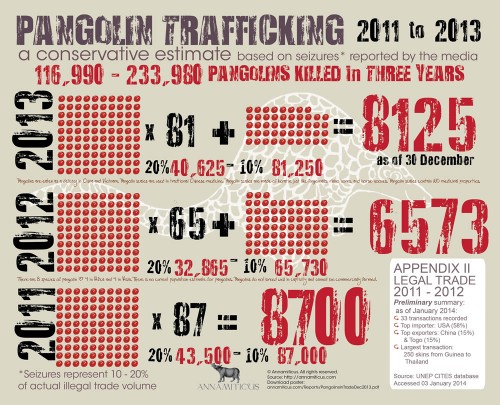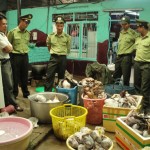
2013 was another deadly year for pangolins, with an estimated 8,125 of these shy creatures confiscated in 49 instances of illegal trade across 13 countries.
Because seizures represent just 10 to 20 percent of the actual illegal trade volume, this strongly suggests that approximately 40,625 to 81,250 pangolins were killed in just one year. Keep in mind, this is a conservative estimate compiled mainly from media reports.
While the majority of pangolins and scales are believed to be sourced from Southeast Asia, alternative source and transit countries continue to emerge. Investigations in mainland China revealed that more than one ton of pangolin scales were trafficked into the country from Pakistan during 2013. Smugglers also attempted to bring pangolin scales into mainland China from Qatar, Nigeria, and Equatorial Guinea. A shipment of 326 kg of pangolin scales intercepted in Hong Kong was said to have come from Africa, though no country was specified. And 50 kg of pangolin scales from Cameroon (believed to be headed for Vietnam) were intercepted by customs authorities at Charles de Gaulle Airport in Paris.
Unsurprisingly, the China-Vietnam border region is somewhat of a trafficking “hotspot”. Vietnam accounted for 31 percent of the volume of pangolins seized and China at 27 percent.
At Vietnam’s busy Hai Phong Port, 16 tons of pangolins and nearly one ton of scales were intercepted, while 261 kg of pangolins were seized in Quang Ninh Province near the China border. Chinese media outlets reported that four seizures totaling 187 pangolins occurred in or near Fangchenggang, which borders Vietnam; a smuggler arrested in China with 73 pangolins claimed that the animals came from Vietnam.
The Philippines accounted for 25 percent of the pangolin seizure volume, almost entirely because of one major incident: A Chinese fishing vessel which ran aground in Tubbataha Reefs Natural Park and was found to be smuggling pangolins.
Of the 49 pangolin trafficking incidents, at least 19 resulted in arrests. In several cases, more than one suspect was arrested. At the time of this writing, three convictions have been reported.
China sentenced one smuggler to three years in jail with three and a half years probation, plus a $4,762 fine. Another was sent to jail for six months and fined $826. In Zimbabwe, a pangolin trafficker was prosecuted to the full extent of the law, receiving an unprecedented nine-year prison term.
We are currently following up on the outcomes to see if there have been more arrests and hopefully, more convictions that resulted in prison terms.
We will publish a more comprehensive report on pangolin trafficking later in 2014. In addition, we will be distributing our findings and joining our colleagues to advocate on behalf of pangolins at the CITES Standing Committee Meeting in July 2014. Please consider supporting our pangolin research with a secure online donation.



![Pangolin Trafficking: 2011 to August 2013 [Infographic]](https://annamiticus.com/wp-content/uploads/2013/08/PangolinsInTrade2011thruAugust2013-150x150.jpg)
![Pangolin Trafficking: 2011 to April 2013 [Infographic]](https://annamiticus.com/wp-content/uploads/2013/04/PangolinsInTrade2011thru2013-150x150.jpg)